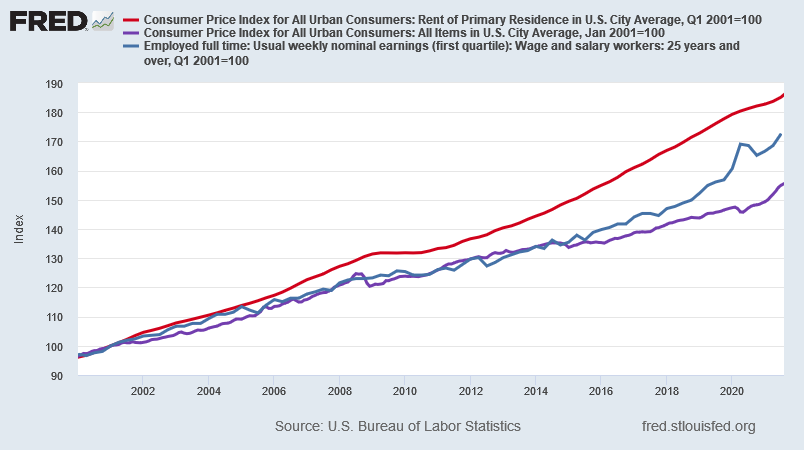Thanks to readers like you, our subscriber count has grown quite a lot in 2023. I’m very grateful for the opportunity to share our work with you! Like many other email newsletters, some issues I cover come up again and again. So, if you are looking for some holiday reading, or are newer to the newsletter, I put together a review of our greatest hits prior to 2023. For each, I’ve written a small blurb about why I think the post is still relevant, and included a preview you can click to get the full article.
This will, in all likelihood, be the last Civic Pulse for the year, so until 2024 we send you our best wishes for a happy, safe, and joyful holiday season however and wherever you celebrate.
On to the topics!
The Housing Crisis
This issue was my attempt at a “Paul Krugman” style article, including using data from FRED to get up-to-date data and charts. I enjoyed learning about the relationship between wages, inflation, and housing costs over time and those topics continue to be critical to debates about the economy ahead of next year’s election.
What my favorite Super Bowl ad says about Americans’ top domestic priority
I have a new habit when I’m brushing my teeth at night – counting vacant houses. Last night I counted 6 vacant units visible out my window. This is in the middle of one of the hottest real estate markets in the country. Vacant houses are on my mind personally (I live in a home that was formerly vacant) and professionally as a shortage of housing sends p…
Data defense
We are fortunate to work with a wide variety of community organizations, some of which are very mindful of how best to assert the credibility of the information that supports their policy claims. We took some time in 2022 to write up some best practices for defending claims made with data when your credibility is in question.
Defend your data
Our main topic this month is critical: the importance of “defending your data” when you are using data to contend with power. There are so many ways to dismiss and undermine arguments that rely on data, and those in power know it. We wrote a short blog post featured on Tableau’s website, which outlines
Get ready for the election year crime wave
I wish this topic wasn’t evergreen, but discussions of crime waves and spending on public safety ebb and flow with the election cycle. If you want to get up to speed on how to navigate all the noise around crime and public safety, this article from 2021 is a good place to start.
What you should know about crime waves and public safety
There’s been lots of discussion of “crime waves” in the past few months. One thing I cannot emphasize enough is how detached these conversations are from both the empirical evidence and the lived experience of violence in the U.S. Whether you are interested in data and measurement, or concerned about how we make safer communities, we’ll talk about …
Understand how policing is organized
In America, policing is a hyperlocal concern with a very large number of very small police forces, even in major urban areas. We used public data to describe the depth of overlap and variety in policing agencies within urban areas to illustrate this point. It’s work I am always keen to continue!
How the Geography of Policing Affects Your Life
In this edition of the Civic Pulse you’ll find: Effective ways to use local ARPA aid The geography of policing and how it impedes change Grassroots reports on policing that Civilytics contributed to Efforts to use community data to identify barriers to student engagement







